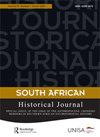反叛乱的不死散文:对珍妮特·切里对南非叛乱和反叛乱评述的回复
IF 1
3区 历史学
Q1 HISTORY
引用次数: 0
摘要
珍妮特·切里(Janet Cherry)对我的书的评论很混乱,在一些地方表现出严重的误读,而在另一些地方则演变为对细节的争论,这些争论对我的主要论文没有挑战,有时甚至没有定论。Cherry坚持认为,“认为南非目前的问题在某种程度上与过去的反叛乱战略有关,委婉地说,这是一个“漫长的过程”,近乎阴谋论”。1但她过分夸大了自己的观点,并对我书中的实际论点进行了粗鲁的讽刺。正如她所说,我并没有将今天困扰南非的所有弊病归咎于种族隔离反叛乱,包括失业、腐败和国家俘获。相反,我的书表明,在1994年南非向民主过渡后的关键10至15年里,反叛乱遗产在破坏国家机构和民主规范方面发挥了至关重要的作用,迄今为止还没有得到充分的理论支持,从而导致了今天南非民主的薄弱。Cherry必须知道,我并不是第一个认为种族隔离政权的秘密战争在1994年4月后继续破坏南非稳定的人。以前的文献已经探讨过这一现象,证实了纳尔逊·曼德拉总统的说法,即在试图克服种族隔离带来的贫困、不平等和犯罪的巨大遗产时,他的政府面临着旨在破坏新民主的老牌安全部队。2.本文章由计算机程序翻译,如有差异,请以英文原文为准。
Counterinsurgency’s Undead Prose: A Reply to Janet Cherry’s Review of Insurgency and Counterinsurgency in South Africa
Janet Cherry ’ s review of my book is confused, in some places demonstrating a gross misreading and in other places devolving to quibbles over details in ways that do not challenge – and sometimes even con fi rm – my primary thesis. Cherry insists that ‘ to argue that the current problems of South Africa are somehow linked to the counterinsurgency strategy of the past is a “ long stretch ” , to put it mildly, and verges on conspiracy theory ’ . 1 But she vastly over-states her case and makes a crude caricature of my book ’ s actual argument. I do not, as she claims, blame apartheid counterinsurgency for all the ills plaguing South Africa today, including unemployment, corruption, and state capture. Rather, my book shows that during the pivotal 10 to 15 years following South Africa ’ s 1994 transition to democracy, counterinsurgency legacies played a crucial and thus far undertheorised role in undermining state institutions and democratic norms, thereby contributing to the weakness in South Africa ’ s democracy today. As Cherry must know, I am hardly the fi rst to argue that elements of the apartheid regime ’ s covert war continued to destabilise South Africa after April 1994. Previous literature has already explored this phenomenon, giving credence to President Nelson Mandela ’ s claims that in attempting to overcome apartheid ’ s overwhelming legacies of poverty, inequality, and crime, his government faced old-guard security force elements aiming to desta-bilise the new democracy. 2
求助全文
通过发布文献求助,成功后即可免费获取论文全文。
去求助
来源期刊

South African Historical Journal
Multiple-
CiteScore
0.70
自引率
0.00%
发文量
37
期刊介绍:
Over the past 40 years, the South African Historical Journal has become renowned and internationally regarded as a premier history journal published in South Africa, promoting significant historical scholarship on the country as well as the southern African region. The journal, which is linked to the Southern African Historical Society, has provided a high-quality medium for original thinking about South African history and has thus shaped - and continues to contribute towards defining - the historiography of the region.
 求助内容:
求助内容: 应助结果提醒方式:
应助结果提醒方式:


